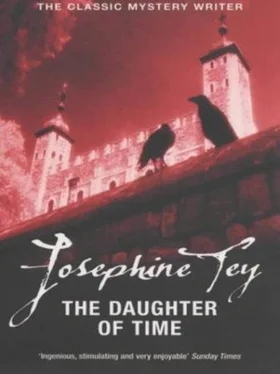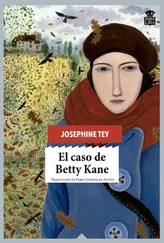‘A little comfort, too. I found after I had written that panic wire to you that he wasn’t at all to be taken as gospel. He just put down what gossip came his way from the outer world. He says, for instance, that Richard had a second coronation, at York; and that of course just isn’t true. If he can be wrong about a big, known, fact like a coronation, then he’s not to be trusted as a reporter. But he did know about Titulus Regius, by the way. He recorded the whole tenor of it, including Lady Eleanor.’
‘That’s interesting. Even a monk at Croyland had heard who Edward was supposed to have been married to.’
‘Yes. The sainted More must have dreamed up Elizabeth Lucy a good deal later.’
‘To say nothing of the unspeakable story that Richard based his claim on his mother’s shame.’
‘What?’
‘He says that Richard caused a sermon to be preached claiming that Edward and George were his mother’s sons by some other father, and that he, Richard, was the only legitimate son and therefore the only true heir.’
‘The sainted More might have thought up a more convincing one,’ young Carradine said dryly.
‘Yes. Especially when Richard was living in his mother’s house at the time of the libel!’
‘So he was. I’d forgotten that. I don’t have a proper police brain. That’s very neat, what you say about Morton being the carrier of the rumour. But suppose the rumour turns up somewhere else, even yet.’
‘It’s possible, of course. But I’m willing to lay you fifties to any amount that it won’t. I don’t for one moment believe that there was any general rumour that the boys were missing.’
‘Why not?’
‘For a reason that I hold to be unanswerable. If there had been any general uneasiness, any obviously subversive rumours or action, Richard would have taken immediate steps to checkmate them. When the rumours went round, later, that he was proposing to marry his niece Elizabeth – the boys’ eldest sister – he was on to it like a hawk. He not only sent letters to the various towns denying the rumour in no uncertain terms, he was so furious (and evidently thought of it such importance that he should not be traduced) that he summoned the “heid yins” of London to the biggest hall he could find (so that he could get them all in at one time) and told them face to face what he thought about the affair.’
‘Yes. Of course you’re right. Richard would have made a public denial of the rumour if the rumour was general. After all, it was a much more horrifying one than the one that he was going to marry his niece.’
‘Yes; actually you could get a dispensation to marry your niece in those days. Perhaps you still can, for all I know. That’s not my department at the Yard. What is certain is that if Richard went to such lengths to contradict the marriage rumour then he most certainly would have gone to much greater lengths to put a stop to the murder one, if it had existed. The conclusion is inevitable: there was no general rumour of disappearance or foul play where the boys were concerned.’
‘Just a thin little trickle between the Fens and France.’
‘Just a thin little trickle between the Fens and France. Nothing in the picture suggests any worry about the boys. I mean: in a police investigation you look for any abnormalities in behaviour among the suspects in a crime. Why did X, who always goes to the movies on a Thursday night, decide on that night of all nights not to go? Why did Y take a return half as usual and very unusually not use it? That sort of thing. But in the short time between Richard’s succession and his death everyone behaves quite normally. The boys’ mother comes out of sanctuary and makes her peace with Richard. The girls resume their court life. The boys are presumably still doing the lessons that their father’s death had interrupted. Their young cousins have a place on the Council and are of sufficient importance for the town of York to be addressing letters to them. It’s all quite a normal, peaceful scene, with everyone going about their ordinary business, and no suggestion anywhere that a spectacular and unnecessary murder has just taken place in the family.’
‘It looks as if I might write that book after all, Mr Grant.’
‘Most certainly you will write it. You have not only Richard to rescue from calumny; you have to clear Elizabeth Woodville of the imputation of condoning her sons’ murder for seven hundred merks a year and perks.’
‘I can’t write the book and leave it in the air like that, of course. I’ll have to have at least a theory as to what became of the boys.’
‘You will.’
Carradine’s mild gaze came away from the small woolly clouds over the Thames and considered Grant with a question in it.
‘Why that tone?’ he asked. ‘Why are you looking like a cat with cream?’
‘Well, I’ve been proceeding along police lines. During those empty days while I was waiting for you to turn up again.’
‘Police lines?’
‘Yes. Who benefits, and all that. We’ve discovered that it wouldn’t be a pin’s-worth of advantage to Richard that the boys should die. So we go on looking round to see who, in that case, it would benefit. And this is where Titulus Regius comes in.’
‘What has Titulus Regius got to do with the murder?’
‘Henry VII married the boys’ eldest sister. Elizabeth.’
‘Yes.’
‘By way of reconciling the Yorkists to his occupation of the throne.’
‘Yes.’
‘By repealing Titulus Regius, he made her legitimate.’
‘Sure.’
‘But by making the children legitimate he automatically made the two boys heir to the throne before her. In fact, by repealing Titulus Regius he made the elder of the two King of England.’
Carradine made a little clicking sound with his tongue. His eyes behind their horn-rims were glowing with pleasure.
‘So,’ said Grant, ‘I propose that we proceed with investigation along those lines.’
‘Sure. What do you want?’
‘I want to know a lot more about that confession of Tyrrel’s. But first, and most of all, I’d like to know how the people concerned acted. What happened to them; not what anyone reported of anyone. Just as we did in the case of Richard’s succession after Edward’s unexpected death.’
‘Fine. What do you want to know?’
‘I want to know what became of all the York heirs that Richard left so alive and well and prosperous. Every single one of them. Can you do that for me?’
‘Sure. That’s elementary.’
‘And I could bear to know more about Tyrrel.’
‘About the man himself, I mean. Who he was, and what he had done.’
‘I’ll do that.’ Carradine got up with such an on-with-the-charge air that for one moment Grant thought that he was actually going to button his coat. ‘Mr Grant, I’m so grateful to you for all this – this—’
‘This fun and games?’
‘When you’re on your feet again, I’ll – I’ll – I’ll take you round the Tower of London.’
‘Make it Greenwich-and-back by boat. Our island Race have a passion for the nautical.’
‘How long do they reckon it will be before you’re out of bed, do you know?’
‘I’ll probably be up before you come back with the news about the heirs and Tyrrel.’
Grant was not, as it happened, out of bed when Carradine came again, but he was sitting up.
‘You can’t imagine,’ he said to Brent, ‘how fascinating the opposite wall looks, after the ceiling. And how small and queer the world looks right way up.’
He was touched by Carradine’s obvious pleasure in this progress and it was some time before they got down to business. It was Grant who had to say: ‘Well, how did the York heirs make out under Henry VII?’
Читать дальше












